I teach natural history and love it. Prior to arriving at Lafayette I taught courses at the University of Chicago and Lawrence University (WI) on the subjects of the ice ages, sedimentology, stratigraphy, paleontology, the environmental history of the earth, and the atmosphere. I have also taught field geology of such places as Wyoming, Iceland, Montana, Hawaii, and the Maritime Provinces of Canada. At Lafayette I teach the following courses:
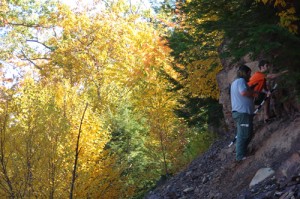
GEOL 215: Sedimentology & Stratigraphy – a course on the creation and meaning of the sedimentary rock record. – NEXT BEING OFFERED IN SPRING 2026
A course on the nature of sediments, sedimentary environments, & stratigraphy. Paleoenvironmental interpretation & basin analysis. Laboratory & field trip(s).
Course Catalog Description:
Sedimentary deposits provide the majority of the water, energy, and mineral resources used by humans. This course explores the processes whereby sediments are formed and accumulate in modern environments, as well as the pathways that convert loose sediments to solid rocks. Emphasis placed on determining environmental conditions recorded in ancient sedimentary rocks. Lecture/laboratory.
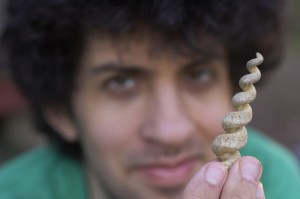
GEOL 320: Paleobiology – a course in macroevolution and paleontology. – NOW BEING OFFERING FALL 2025
An advanced-level course in the character and meaning of the fossil record. Topics include fossilization, evolution, biogeography, and paleoecology. Any biology or geology course is sufficient prerequisite. Counts as an Ecology & Evolutionary Biology (EEB) distribution requirement in the Biology major at Lafayette. Laboratory & weekend field trip(s).
Course Catalog Description:
An organismal and systems approach to the study of the marine and terrestrial fossil record. The course focuses on evolution, diversification, and extinction of biotas in the context of the environmental history of Earth. Lecture, weekly laboratory, and one weekend field trip.
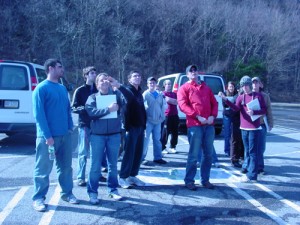
GEOL 130: Dinosaurs, Darwin, & Deep Time – an historical geology course with an evolutionary twist. – NOW BEING OFFERED IN FALL 2025
An introduction to historical geology and natural history. Topics include the antiquity of the earth, the plate tectonics paradigm, the fossil and stratigraphic records, and North American geological history. There is a heavy emphasis on evolution in this course including how life’s evolution is related to geological evolution of the Earth’s crust. Laboratory & field trips.
Course Catalog Description:
Human occupation of this planet has been confined to the amazingly brief, last sliver of geologic time.This course is an introduction to the immensity of deep time before our existence. The class explores how the history of gradual processes, exceptional events, and biotic evolution has shaped our world and, ultimately, us. Course topics include the fundamentals of earth materials, plate tectonics, and paleobiology.
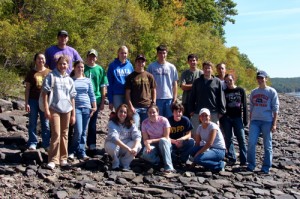
FYS 157: Islands & Isolation – a first year seminar course on phenomena surrounding isolation. – NEXT OFFERING TBA
This course is in the First Year Seminar Program at Lafayette College. A seminar course exploring islands in the broad sense. How do they originate? How are they distributed now and in the past? What are the biological and ecological effects of isolation? How is isolation important in natural history? What about cultural isolation? Readings include works by E.O.Wilson, David Quammen, Jared Diamond, and, of course, Charles Darwin. One weekend field trip.
Course Catalog Description:
Islands are, almost by definition, unique. While being temporary homes to an increasing number of tourists, they also harbor endemic biological oddities and are among the most fragile ecosystems on Earth. This seminar examines the situation of isolation across the fields of geology, evolutionary biology, human geography, and literature. Topics include the dynamics of isolated populations, the historical importance of islands, and the effects of isolation on culture and the human psyche.
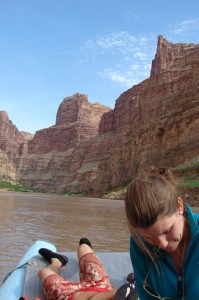
GEOL 160: Geology of the National Parks (interim field course co-taught with Dr. L. Malinconico) – a field course on the geology and human-environment interaction in Utah, Arizona, and Nevada. – NEXT OFFERING TBA
The National Park System in the Western United States provides a unique opportunity for us to examine how geological processes shape the Earth. This course will travel to national parks in Arizona and Utah to develop an understanding of these processes. In essence, we will be able to study many of the topics covered in an introductory geology course, but do so with an experimental field course instead of the traditional semester lecture-lab model. The course begins with two days of intensive study at Lafayette where we review basic geologic concepts and earth materials.
Course Catalog Description:
The National Park System in the Western United States provides a unique opportunity to examine how geological processes shape the Earth. Visits to parks in Colorado, Arizona, New Mexico, California, and Utah help students develop an understanding of these processes. Introductory geology topics are covered in an experiential field experience. In the canyon lands (Grand Canyon, Bryce, and Zion), students examine processes of sedimentation, igneous intrusion, and erosion. The record of life on Earth is studied in the fossil record on the rocks. In California, geological hazards are learned by studying the San Andreas Fault, mass-wasting in Pt Reyes National Seashore, and volcanism at Lassen volcano.
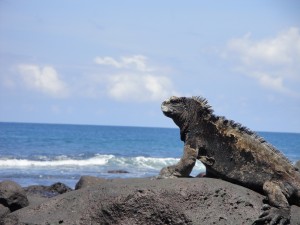
GEOL 170: Geological & Paleobiological Evolution of Ecuador & the Galapagos Islands (interim field course co-taught with Dr. L. Malinconico) – NEXT OFFERING TBA
This course will be an investigation into the evolution of life and land in the Andean highlands of Ecuador & among the Galapagos Islands. As such, the course considers both geological and biological concepts in an environmental context. Study topics include plate tectonics, volcanism, biological evolution, natural hazards, biogeography, and human ecology in sensitive eco-regions. Most of the three-week course occurs in the field among the peaks of the Andes and the Galapagos islands. The course begins with two days of intensive study at Lafayette where we review basic geologic concepts and earth materials.
Course Catalog Description:
This course will examine the coupled natural history of earth and life over geological time scales. We will focus on the origin of oceanic crusts and hotspot island archipelagos, the development of continental mountain ranges, and the relationship of geological processes to biogeography and biological evolution.
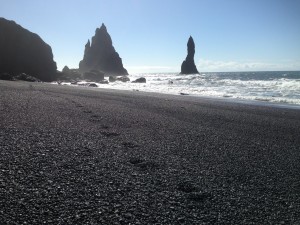
GEOL 180: Iceland: Geology & Natural History of a Young Island (interim field course co-taught with Drs. L. Malinconico & T. Carley) – a field course on geology and human-environment interaction in Iceland –
NEXT OFFERING TBA
Course Catalog Description:
Iceland is a geologically new and unique island. The dynamic glacial environments, sub-polar climate, and thunderous river systems of the country sit atop an active volcanic system on a divergent plate boundary. This intensive field course explores the geological processes that shape the island’s landscape and the climate and life of a sub-polar biome. The course also addresses aspects of Iceland’s human ecology from its early settlement to modern issues of energy, agriculture, and sustainability.
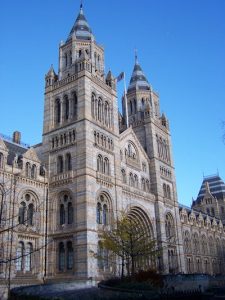
GEOL 191: London & the History of Natural History (Fall semester course in London, England) – a study abroad course on the fundamentals, origins, and major historical figures in geology & evolutionary biology. – NEXT OFFERING TBA
London has long been, and continues to be, a hub for the science of natural history. The foundations of modern geological and evolutionary thought were incubated in the city and in the surrounding countryside. Even ideas that were not born here, were put through the mill of intellectual discussion in London, and these ideas emerged to change the world.
In addition to the fundamentals of historical geology and evolutionary biology, this course will explore the societal context, influential people, important places, and essential ideas that have come to mark the history of natural history; and how London has, all the while, been central to the growth of the scientific revolution.
The course will take place a short Tube trip from University of London, Goldsmiths, within the Natural History Museum and involves local excursions to Kew Gardens, Darwin’s Downe House, and Dover Cliffs, as well as a longer excursion to the Scottish Highlands and Edinburgh.
Course Catalog Description:
London is a hub for the science of natural history. Indeed the foundations of modern geological and evolutionary thought were put through the mill of intellectual discussion here, and these ideas emerged to change the world.
In addition to concepts in historical geology and evolutionary biology, this course will explore London’s societal context, important places, significant people, and their essential ideas that have so influenced the history of natural history and the scientific revolution.
**In Fall 2009 I led a graduate student discussion seminar called “Paleoecology of Ancient Forested Ecosystems” at the University of Alaska, Fairbanks in the Department of Geology & Geophysics.